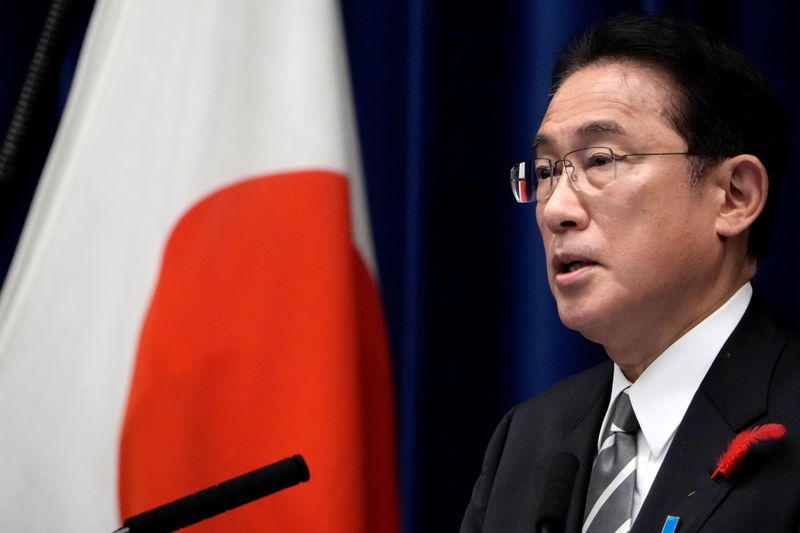By Takahiko Wada
TOKYO (Reuters) -Japanese Prime Minister Fumio Kishida wants to ease quarterly disclosure requirements for companies as part of his pledge to forge a "new capitalism", but implementation could take years, complicating the outlook for one of his key promises.
Just weeks into office and facing a tightrope election on Sunday, Kishida already had to water down a pledge to raise the capital gains tax, for fear of hurting stock prices.
Delays to disclosure requirements plans would cast more doubt on Kishida's ability to push through policies to redistribute wealth and close the wage gap.
"Stock prices may fall if Kishida pushes through (a review of disclosure rules). But it's part of his mandate of turning away from policies just seeking short-term return," said Daiju Aoki, chief Japan economist at UBS Sumi Trust Wealth Management.
"If he wants to forge a new capitalism that looks not just at shareholders' interest but social and environmental issues, this is something he must accomplish."
Japan made quarterly disclosure mandatory in 2008 as part of efforts to make its rules more aligned with that of the United States and increase market appeal to overseas investors.
But some ruling party lawmakers have called for relaxing the rule, arguing that quarterly disclosures force companies to focus too narrowly on short-term gains.
"Companies must do business from a long-term perspective and in a way that benefits not just shareholders, but employees and business partners," Kishida told parliament on Oct. 8.
"We must create an environment to encourage this, such as by reviewing quarterly disclosure rules and, in return, have firms ramp up disclosure of non-financial information," he said.
With an election looming, however, Kishida's administration has made little progress in kicking off the process.
Discussion at a panel overseen by the Financial Services Agency (FSA), which lays the groundwork for crafting necessary legislation, won't start until next year, government officials with knowledge of the matter say.
"It's an issue that will discussed through next year," one of the officials said.
The earliest the government can submit legislation to parliament will be 2023 and for new rules to be applied in 2024, the officials said on condition of anonymity because they were not authorised to speak publicly.
When asked for comment, the FSA said there has been no decision yet on when the topic will be discussed at the panel.
There are doubts on whether the FSA would willingly heed to Kishida's calls. The agency reviewed the feasibility of mandatory quarterly disclosures back in 2018 and concluded it was necessary for investors.
"We need quite solid justification to reverse what's now mandatory into voluntary rules," said an FSA official.
Private sector reaction remains mixed.
Yoshihiko Kawamura, chief financial officer of Hitachi (OTC:HTHIY), welcomed Kishida's proposal given the heavy burden of preparing quarterly documents.
"There's talk within our company on how long we can continue doing quarterly disclosure," he said.
Akira Kiyota, CEO of Japan Exchange Group, is cautious, saying information must be disclosed in a timely manner to ensure stocks accurately price in corporate value.
Yutaka Suzuki, an analyst at Daiwa Institute of Research, says it's unclear how a review of quarterly disclosure would help Kishida achieve wealth redistribution.

"If a lack of timely information disclosure raises uncertainty over corporate management, that could prompt risk-averse investors to pull money out of the stock market, making it difficult for companies to raise funds," he said.
"It could also send a wrong message to overseas investors, who may think Japan is passive about information disclosure."